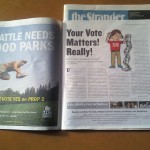Also from the recent NCSL newsletter, Federal legislation that they believe may garner significant interest in 2009-10:
Joint Resolution Pertaining To U.S. Senate Vacancies
S.J. RES 7 – Sen. Russell Feingold (D-WI)
Senate Joint Resolution 7 proposes a Constitutional amendment providing that no person shall be a Senator from a state unless such person has been elected by the people thereof, and that when vacancies occur, the executive authority of such state shall issue writs of election to fill such vacancies. At press time, the resolution had two cosponsors.
The Voting Integrity and Verification Act of 2009
S. 48 – Sen. John Ensign (R-NV)
Senator Ensign’s bill amends the Help America Vote Act (HAVA) of 2002 to require each voting system purchased after December 31, 2012, and used in an election for federal office to produce an individual permanent paper record for each ballot that is cast. Requires the Director of the National Institute of Standards and Technology to establish a program to award cash prizes competitively to eligible persons that advance the research, development, demonstration and application of voting systems which are specifically designed to enhance accessibility and provide independence for persons with disabilities during the voting process.
Weekend Voting Act
S. 149 – Sen. Herb Kohl (D-WI)
S. 149 and its companion bill, H.R. 254, would abolish the longstanding congressional act setting federal Election Day on the Tuesday after the first Monday in November. It would instead establish the first Saturday and Sunday after the first Friday in November, in every even numbered year, as the days for congressional elections. The same would apply to presidential elections. The bill would further establish standardized polling place hours on these weekend election days; polls would be required to open at 10 AM EST on Saturday and remain open until 6 PM EST Sunday. States would retain authority to close the polls between 10 PM local time on Saturday and 6 AM local time on Sunday. The House sponsor, Rep. Steve Israel (D-NY), in a New York Times OP-ED (October 24, 2008) wrote that a few days of early voting would also be provided in presidential elections.
Ex-Offenders Voting Rights Act of 2009
H.R. 59 – Rep. Shelia Jackson-Lee (D-TX)
This House bill declares that the right of a U.S. citizen to vote in any election for federal office shall not be denied or abridged because that individual has been convicted of a criminal offense unless, at the time of the election, such individual is serving a felony sentence in a correctional institution or facility. It also requires the chief correctional officer of each state to inform convicted felons within 30 days after their release of their right to vote in elections for federal office and the date of the next election in which they are eligible to vote.
Voting Opportunity and Technology Enhancement Rights Act of 2009
H.R. 105 – Rep. John Conyers (D-MI)
According a House Judiciary Committee press release (January 06, 2009), “The Voting Opportunity and Technology Enhancement Rights Act (VOTER) will “protect and expand voting rights in federal elections, as well as ensure the proper administration of federal elections by requiring, among other things, early voting, same day registration, proper allocation of poll workers and voting machines, and an Election Day federal holiday.” The bill would amend HAVA in setting new federal mandates governing early voting, the counting of provisional ballots, removing names from voter registration lists, voter identification, voting systems, recounts, and other election administration policies. At press time, the bill had five cosponsors.
The Critical Election Infrastructure Act of 2009
H.R. 253 – Rep. Alcee Hastings (D-FL)
Representative Hastings’ bill directs the Election Assistance Commission (EAC) to make grants to eligible states to carry out election administration improvement plans to promote efficiency and fairness in the operation of polling places in federal elections (including early voting sites), which may include: (1) acquisition of additional voting systems and equipment; (2) improved training of election administration officials; and (3) allocation of additional election administration officials to polling places serving greater numbers of voters.
American Elections Act of 2009
H.R. 764 – Rep. Dean Heller (R-NV)
H.R. 764 would amend the Help America Vote Act of 2002 to require that ballots used in federal elections be generally printed only in English. The bill would also amend the Voting Rights Act of 1965 to modify the requirement that certain jurisdictions provide ballots and other voting materials in languages other than English. At press time, H.R. 764 had 17 cosponsors.


